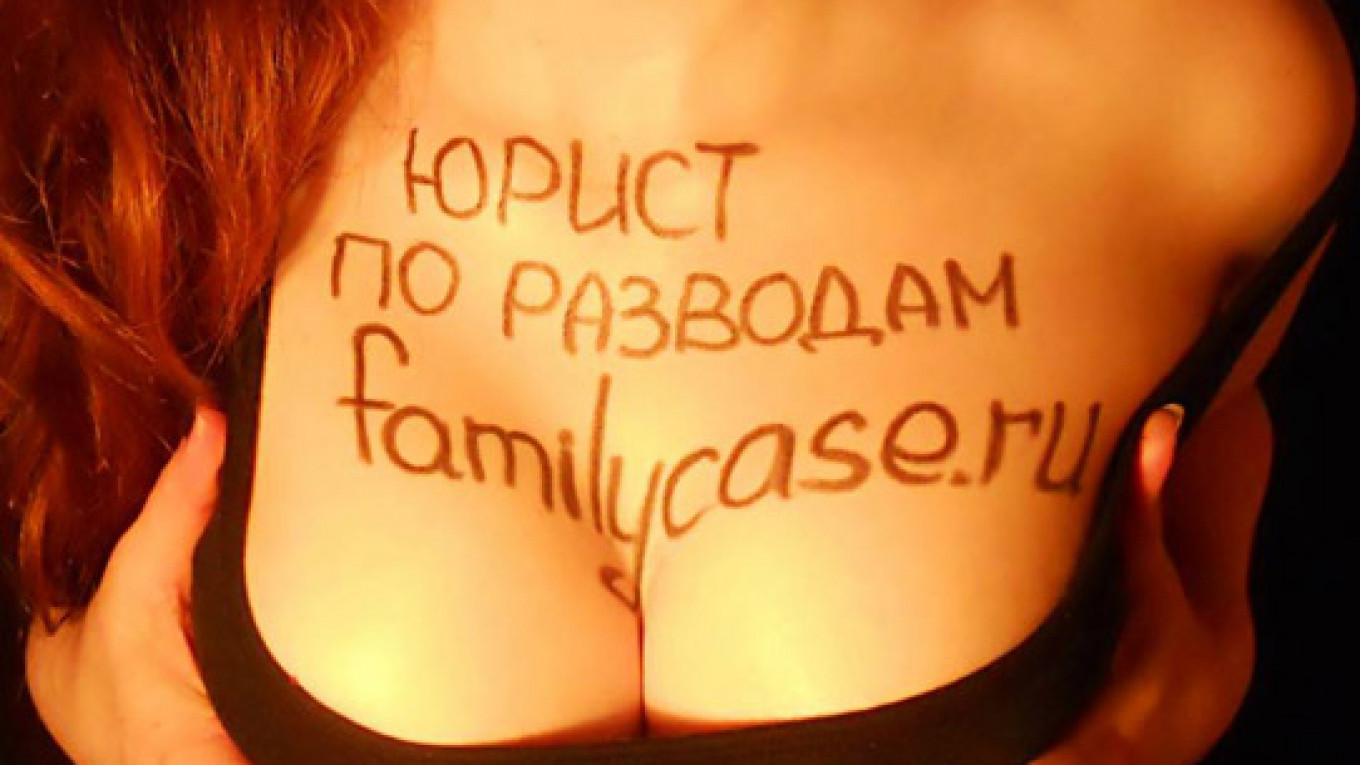When Moscow law firm Family Case, whose website boasts a knack for "the delicate resolution of family problems," decided to advertise recently, it chose a new way to attract new clients: Tittygram.
Tittygram, a new Russian start-up website that markets itself as "Uber for boobs," allows anyone to send a photo with a message written on a young woman's breasts. In Family Case's photo, the words "divorce lawyer" were written just below the neck of a buxom woman with the firm's website scrawled below that on her pushed-up breasts.
"Divorce, tits, they're quite close to each other," joked Vladimir Bachurin, a partner at the firm, in a telephone interview Monday, adding that he found Tittygram "amusing."
To send a Tittygram, customers pay $9.95 and a model writes their message — maximum 35 characters — on their breasts, which are never fully shown and have no nipples in sight, and sends it on. The model's face is not visible either.
The site, which launched at the end of March, has proved so popular that staff are working 24 hours a day and 2,000 photos have been sent out already, Tittygram CEO Vladimir Gritsenko told The Moscow Times on Monday in a phone interview from the Volga River city of Ulyanovsk where the company is based.
Most people use Tittygram to send birthday wishes or congratulations messages, he said. One message on the site has a drawing of Albert Einstein's head on a left breast and the equation E=m*c2 on the right breast.
Models get at least 150 rubles per photo, he said. As with the taxi app Uber, there is a surcharge if demand is high, he said. The website donates 2 percent of its proceeds to the Breast Cancer Research Foundation.
The company already has models from the United States, China and South America on its books, he said, adding that it was "open to anyone who has something to offer."
When U.S. fast-food chain Burger King in Russia used Tittygram to advertise its services, publishing a photo on Instagram with the words "I love Burger King" written on a pair of breasts, most — but not all — of the comments were enthusiastic. ?
"Does Burger King need customers so badly that they will stoop to such vulgarity?" responded Anastasia Zarechenskaya. Another user, Katya Tarelkina, posted a link to a feminist campaign against sexist adverts with the tagline "If your product was any good you wouldn't need sexism to sell it."
Burger King in Russia did not respond to an e-mail Monday. Gritsenko said that Burger King did not hire them directly and that whoever had ordered the photo, presumably an advertising agent, had paid the standard fee of $9.95 for the photo.
Gritsenko deflected accusations of sexism, saying that many of the models had previously done similar work for Russian websites such as VKontakte, the Russian equivalent of Facebook, as part of a Russian Internet phenomenon called "sign."
"Sign" also involved young women sending photos of parts of their body with messages drawn on them for money, or sometimes simply for "likes" on social networks. The website Silicon Russ posted a price list in 2012 that started at 40 rubles for messages on hands, with bare breast messages costing 100 rubles.
Gritsenko argues that like Uber for taxi users, "Uber for boobs" makes interaction between the customer and the supplier safer, as the models do not directly deal with those paying for the photos.
"Nobody forces them to do it and they used to do it before and it was dangerous. This way it is much safer," he said.
What Gritsenko did find vulgar is that when the site launched in the United States at the start of April about 20 percent of would-be clients wanted "bad words" writing, "which would be offensive for the models and for other people."
Two similar sites, titstamp.com and titisign.com have already appeared and were advertising their wares in the comments section of Buzzfeed, which wrote about Tittygram last week.
Contact the author at k.oflynn@imedia.ru
A Message from The Moscow Times:
Dear readers,
We are facing unprecedented challenges. Russia's Prosecutor General's Office has designated The Moscow Times as an "undesirable" organization, criminalizing our work and putting our staff at risk of prosecution. This follows our earlier unjust labeling as a "foreign agent."
These actions are direct attempts to silence independent journalism in Russia. The authorities claim our work "discredits the decisions of the Russian leadership." We see things differently: we strive to provide accurate, unbiased reporting on Russia.
We, the journalists of The Moscow Times, refuse to be silenced. But to continue our work, we need your help.
Your support, no matter how small, makes a world of difference. If you can, please support us monthly starting from just $2. It's quick to set up, and every contribution makes a significant impact.
By supporting The Moscow Times, you're defending open, independent journalism in the face of repression. Thank you for standing with us.
Remind me later.


